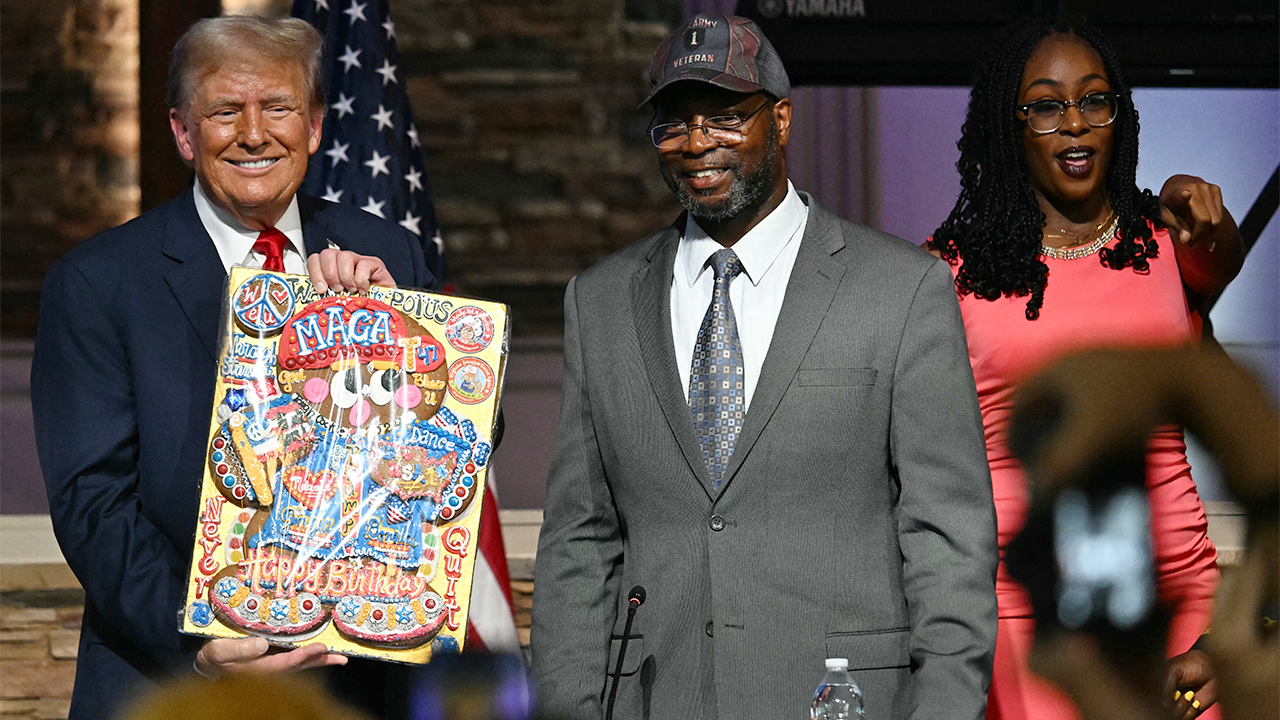Entertainment
'Seinfeld' star Michael Richards is more than the worst thing that ever happened to them
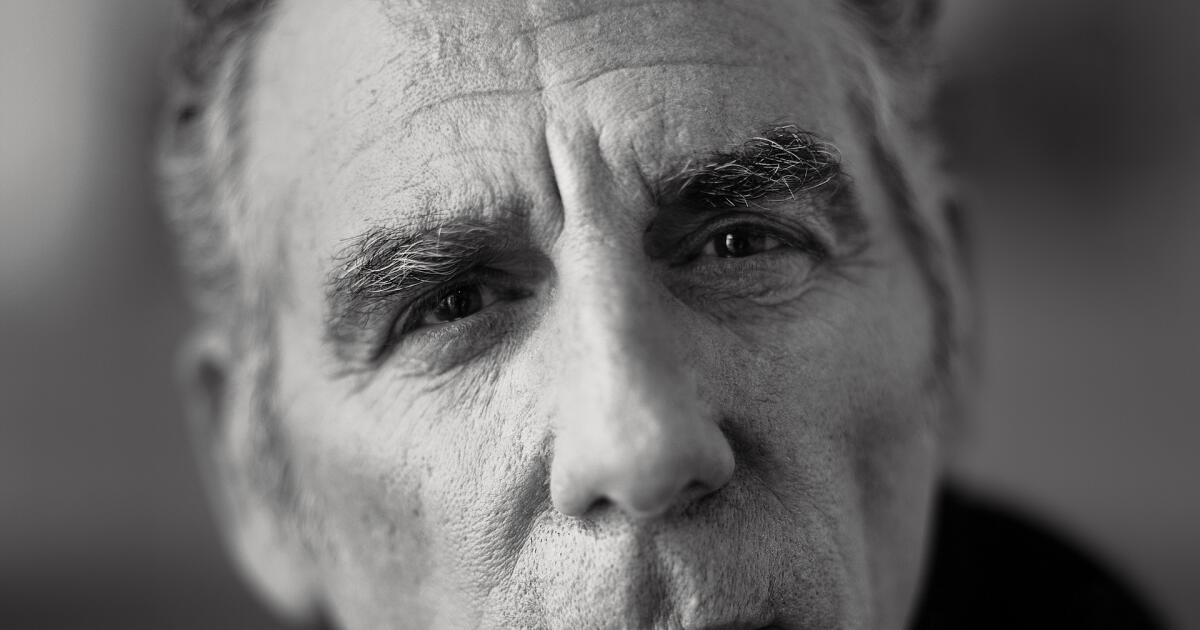
Michael Richards, who shot to fame as Kramer on the hit sitcom “Seinfeld,” is releasing a memoir, “Entrances and Exits.”
(Marcus Ubungen / For The Times)
On the Shelf
Entrances and Exits
By Michael Richards
Permuted Press: 440 pages, $35
If you buy books linked on our site, The Times may earn a commission from Bookshop.org, whose fees support independent bookstores.
Michael Richards entered the cultural consciousness, and the apartment next door, as a force of spontaneity named Cosmo Kramer. He was the rubber-limbed, unchained id of “Seinfeld,” the most popular sitcom of its era and a cultural phenomenon cultish in its fervor but too massive to really be considered a cult. Richards and Kramer worked without a net. The energy, the motion, the kavorka forever verged on chaos. But the chaos had a purpose, and it was tremendously popular. Richards won three Emmys for the role, and regularly earned the show’s biggest laughs.
Then, late one November night in 2006, the chaos tipped over into disaster. Performing a surprise set at the Laugh Factory, a venerable Los Angeles comedy club, Richards responded to some hecklers with a viciously ugly tirade. He hurled the N-word about, over and over, turning a night of uncomfortable comedy into the kind of incident that destroys careers. This was early in the era of ubiquitous cellphone cameras, when a horrible mistake could instantly be transmitted around the world. Richards quickly pivoted to damage control, making an appearance via satellite to apologize during his friend Jerry Seinfeld’s visit to “The Late Show With David Letterman.” But the damage was done. He was now widely labeled a racist, and worse.
Richards addresses his night of infamy in his new memoir, “Entrances and Exits,” and once again apologizes. The pop culture mulch machine will quickly reduce the book to soundbites: “Michael Richards says he’s not a racist!” But the Laugh Factory incident is but one tendril of Richards’ book, albeit an important one, tying into the dangerous high-wire act of performance in general and stand-up comedy in particular. It’s the story of a very lonely kid, raised by a working mother, a schizophrenic grandmother and the streets of Southern California; an army veteran who found his life’s purpose on the stage, poured everything into his craft, rose to the height of his profession, never learned to control his rage, flamed out in horrific fashion — and set about slowly rebuilding himself.
It’s also a reminder that everyone is more than the worst thing that ever happened to them — and that stability and comedy don’t always get along.
“It’s what I call the irrational,” Richards, 74, said in a telephone interview from his L.A. home. “We’re constantly being challenged … and anger’s in the midst of it. So it’s always an ongoing endeavor with me. We strive to be persistently rational, but there’s always the irrational, there’s always the mistake, there’s always the pratfall.”

“Public condemnation and humiliation are forms of justice,” Michael Richards writes in his memoir about the response to his racist Laugh Factory rant.
(Marcus Ubungen / For The Times)
Before Kramer, before public shame, there was a child wandering around Baldwin Hills, wondering who his father was and what might have happened to him. The kid soon discovered he liked to perform in drama class. It gave him a way to release the confusion and anxiety inside, and to make people laugh. But the kid still had a restless spirit. He studied acting at the California Institute of the Arts, created an absurdist, highly physical comedy act with his friend Ed Begley Jr. and was drafted into the army in 1970. Stationed in West Germany, he joined the V Corps Training Road Show; he took on the role of a colonel for that theater company. He stayed in character 24/7, even obtaining fake official military identification. It was the start of a lifelong obsession with creating and inhabiting a persona.
By 1989, when fellow former “Fridays” writer-cast member Larry David and Seinfeld had him audition for a new series then called “The Seinfeld Chronicles,” Richards was ready to launch. Much of his character, who was originally called Kessler, was on the page. But Richards built him into a rollicking, three-dimensional creation, right down to the clothes on his back.
“What Kramer wore was all hand-picked by me,” Richards said. “I gathered that wardrobe by combing every secondhand store in Southern California looking for shirt packs. All the clothing is out of the ’60s because my character is still pretty much wearing what he wore then. That’s why the pants are short and so forth, because he’s just a little taller. Everything about the character is justified.”

In “Entrances and Exits” Richards writes that he always considered himself more of a character actor or performance artist than a comedian, though he was also a creature of the comedy clubs on and off throughout his career. His act was never scripted and usually wild — falling on tables, walking onto the stage, futzing with the microphone stand and leaving. More than once in the book Richards uses the word “knockabout” to describe his school of comedy. But he also could be quite disciplined: Between seasons of “Seinfeld” he was often off studying acting in New York, trying to hone his craft.
Onstage, Richards generally went where the spirit moved him. And the spirit could get dark and unpredictable. He was friends with Sam Kinison, a comic whose entire act was based in rage, and there were times when Kinison alarmed Richards with the diamond-like purity of his anger. “He scares me,” Richards writes of his early impressions of Kinison. “I think he’s crazy and I’m heading in the same direction.”
By 2006 “Seinfeld” was in the rearview mirror. Richards’ follow-up series, “The Michael Richards Show,” had been swiftly canceled in 2000. He was a little adrift, and dipping his toe back into stand-up. On Nov. 17, 2006, he took the stage at the Laugh Factory later than usual. He was ill at ease, in angry-comedian mode, walking that razor’s edge between volatile performer and unhappy human. Then he heard the voice from the balcony: “We don’t think you’re very funny!”
“Of course, looking back at it, I wish I had just agreed with him,” Richards writes. “‘Okay, I’m not very funny tonight. Is there anything I can do? Wash your car, mow your lawn? I don’t want you leaving dissatisfied.’ Instead, I take his remark pretty hard. A solid punch below the belt.”
And he snapped — loudly, violently, using some of the ugliest language known to man.
Yes, he is sorry. And he accepts the descent into purgatory that followed. “Public condemnation and humiliation are forms of justice,” he writes. And nothing about his personal rehabilitation seems merely performative. Richards has spent his post-Laugh Factory years learning to live with himself away from the stage (although he still welcomes the occasional acting gig). He has studied the Hindu philosophy of Vedanta in Cambodia. He and his second wife, Beth, had a son, with whom he has finally brought himself to enjoy watching “Seinfeld” (for many years he was haunted by thoughts of how much better his performance could have been). He has fought, and, for the time being, defeated prostate cancer.

Michael Richards says these days, “I sit with the natural world, which seems to be behind most of everything we’re up to.” His memoir, “Entrances and Exits,” is out June 4.
(Marcus Ubungen / For The Times)
He is intent to continue doing what he calls “heart work,” figuring out who he really is and what animates the darkness within. Much like the kid who once roamed Baldwin Hills, he takes daily walks in the mountains of Southern California. “I want to get behind the behind, behind the words, the anger, the person, the cultural conditions and so forth,” he said. “So I sit with the natural world, which seems to be behind most of everything we’re up to.”
Pleas for forgiveness can get boring. “Entrances and Exits” is something else: an accounting of a life and the performances that go into it, for better and worse.

Movie Reviews
Short Film Review: Willow and Wu (2024) by Kathy Meng
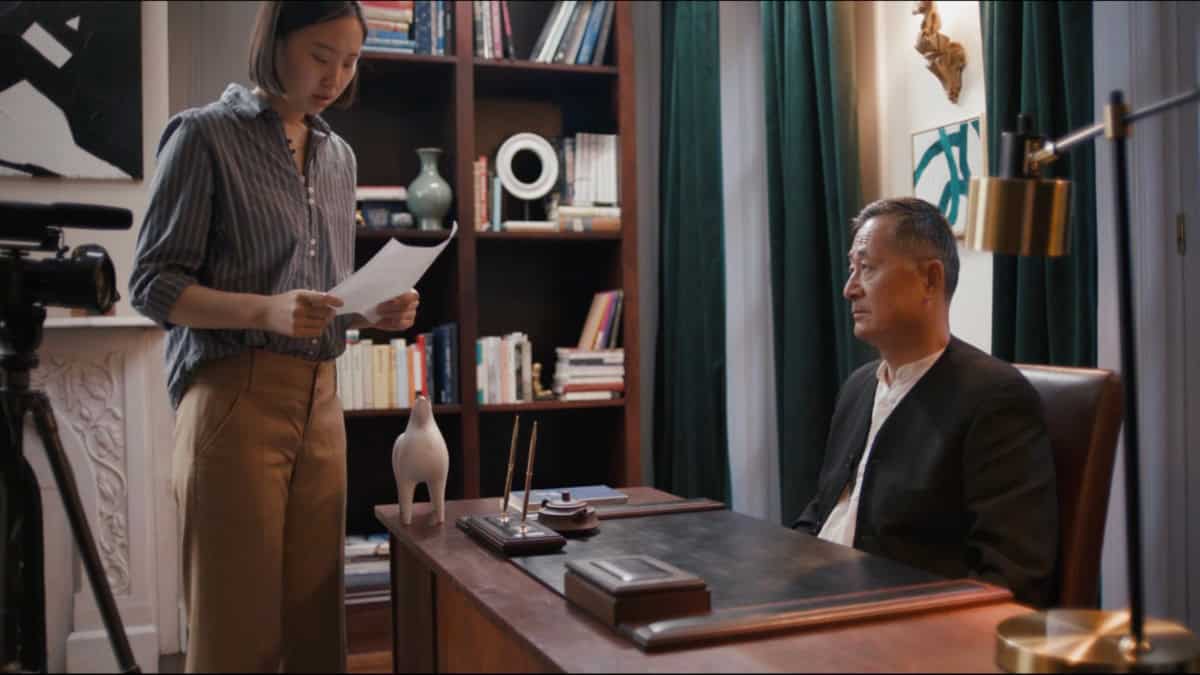
“Very few friends travel through a lifetime with you”
Fourth film by Kathy Meng, following “Elite Match”, “Willow and Wu” is a film shot in NYC, which has won the award for Best Screenplay at 27th Brooklyn Film Festival.
The film begins with a rather intense scene, where Waley seems to be breaking up with a girl through a video call. The girl’s cries following the call cements the fact, while the next scene has her, Willow, in an obviously depressed state receiving a call from Mrs Wu, her boss, insisting that she comes to her house right away. It turns out that although she is her assistant, Willow has to help her husband this time. Mr Wu wants to be filmed on a script his wife wrote and wants Willow to handle the recording. With her not having prior experience and being quite anxious, things do not go exactly smoothly.
Moreover, the video seems to focus on the passing of his friend Bao and soon asks her to read the script, before he decides to shoot the whole thing outside, even asking her to put some make up on him. It turns out that he is also anxious, which is why he appears so demanding. Eventually, loss brings the two closer.
If you like Willow and Wu, check also this review
Kathy Meng follows the film-about-film meta trope in her short, in order to present her comments. Loss, and how difficult it can be for people to express it is the main one, but there is more. That people who appear being difficult or even unlikeable can actually have reasons for being that way is also commented upon, as much as how opening up can help overcome psychological issues. That both protagonists benefit from this last aspect adds to the particular remark. Lastly, one could say that Meng also comments on how acting works, and how directors can cooperate with the actors in order for the latter to perform they way they expect them to.
Although there is a dramatic base here, Meng instead opts for a more happy-go-lucky approach, which works quite well in general, particularly during the finale in the park, which is surprisingly cheerful. Aolan Guo’s smile as Willow, who gives an overall excellent performance, will definitely stay on the mind of any viewer, as will Yves Yan’s actual performance in the end, as Wu. Overall the acting is on a high level here with the two protagonists’ chemistry also being of the highest level.
Sancheev Ravichandran captures both the interiors and the exteriors shots with realism, without any particular exaltation, with the close-ups working well. Remy LaFlamme’s editing results in a fast pace that allows the full story to be leisurely told in just 13 minutes.
“Willow and Wu” is a very appealing short that manages to tell a full story in rather economical and entertaining fashion. I think Meng is ready to transition to features, as I think she would be quite good in a family drama.
Entertainment
2024 Tony Awards winners list: 'Stereophonic,' 'The Outsiders,' Jeremy Strong, Daniel Radcliffe
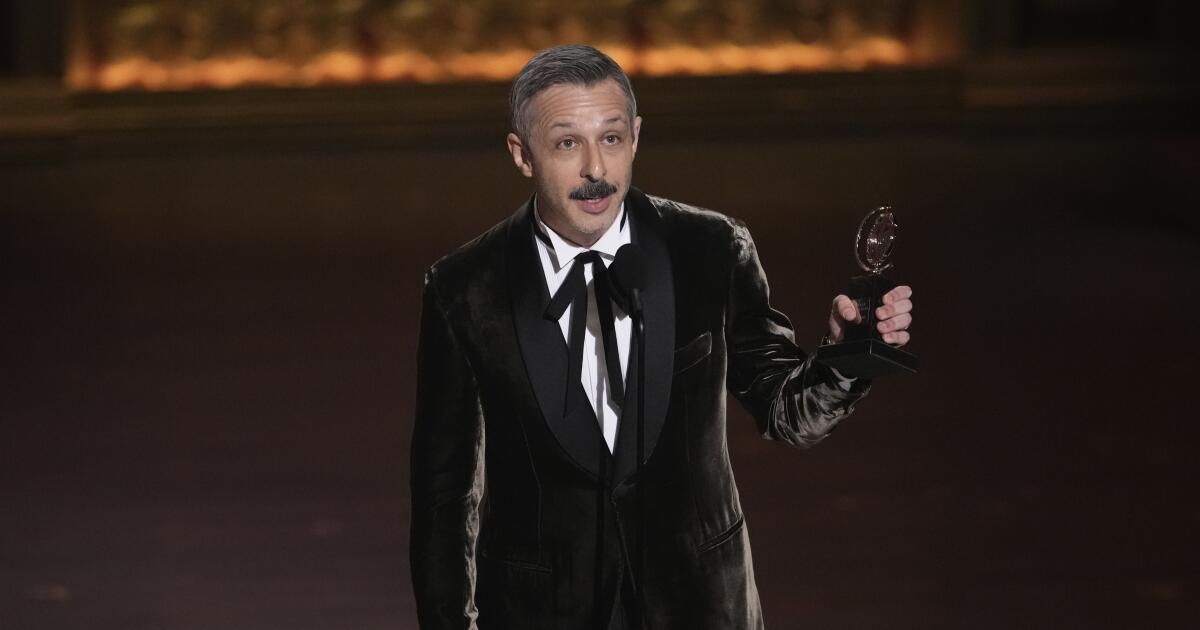
David Adjmi’s “Stereophonic” scored five Tony Awards including best play, and “The Outsiders” took home four trophies including an upset win for best musical as Broadway honored its finest on Sunday night.
Jonathan Groff won lead actor in a musical and co-star Daniel Radcliffe won featured actor for “Merrily We Roll Along,” which took home four awards total including best revival of a musical. Heading into the ceremony, the Alicia Keys musical “Hell’s Kitchen” and “Stereophonic” led with 13 nominations each, and a starry list of contenders included Eddie Redmayne for “Cabaret at the Kit Kat Club,” Jessica Lange and Jim Parsons for “Mother Play,” Rachel McAdams for “Mary Jane,” Leslie Odom Jr. for “Purlie Victorious,” and Sarah Paulson and Corey Stoll for “Appropriate.” The ceremony can now be streamed on demand; here’s how.
The complete winners list:
The company of “The Outsiders” performs during the 77th Tony Awards on Sunday.
(Charles Sykes / Invision / AP)
Best musical
“Hell’s Kitchen”
“Illinoise”
WINNER — “The Outsiders”
“Suffs”
“Water for Elephants”
Best play
“Jaja’s African Hair Braiding”
“Mary Jane”
“Mother Play”
“Prayer for the French Republic”
WINNER — “Stereophonic”
Best revival of a musical
“Cabaret at the Kit Kat Club”
“Gutenberg! The Musical!”
WINNER — “Merrily We Roll Along”
“The Who’s Tommy”
Best revival of a play
“An Enemy of the People”
WINNER — “Appropriate”
“Purlie Victorious: A Non-Confederate Romp Through the Cotton Patch”
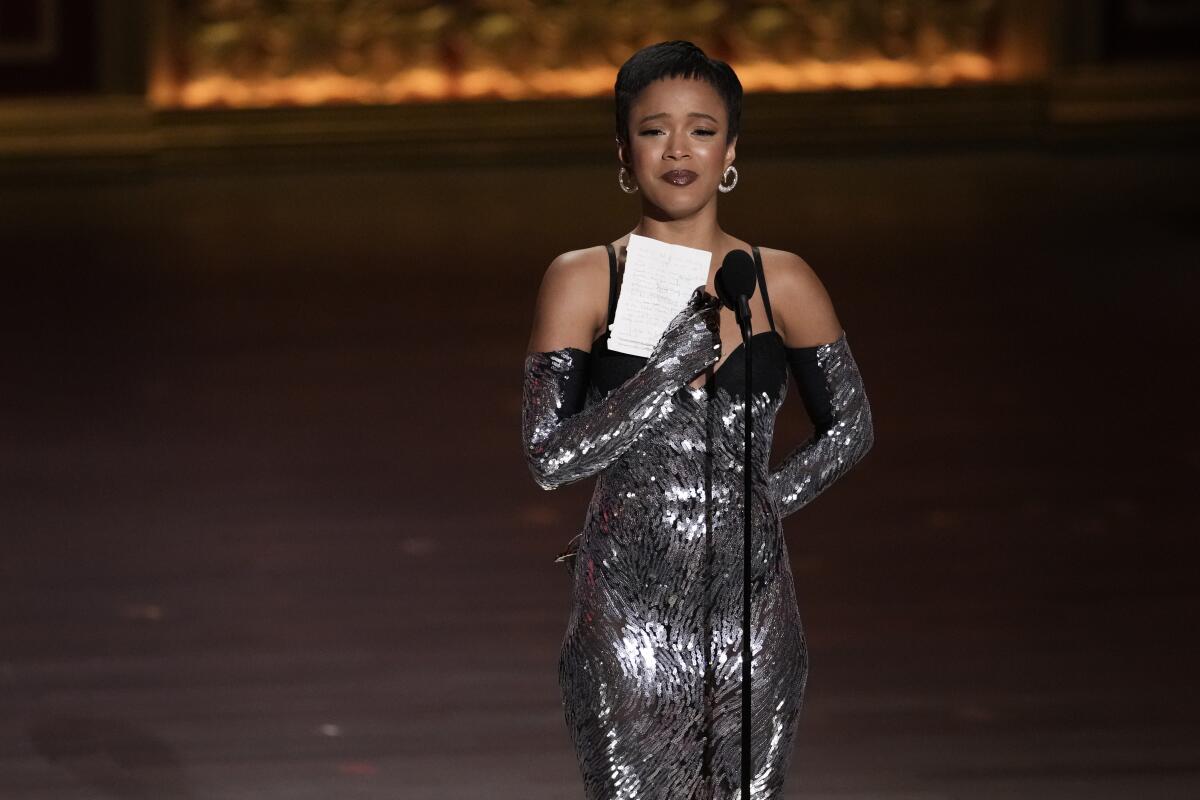
In the most moving speech of the night, Maleah Joi Moon accepts the Tony for lead actress in a musical for “Hell’s Kitchen.”
(Charles Sykes / Invision / AP)
Lead actress in a musical
Eden Espinosa, “Lempicka”
WINNER — Maleah Joi Moon, “Hell’s Kitchen”
Kelli O’Hara, “Days of Wine and Roses”
Maryann Plunkett, “The Notebook”
Gayle Rankin, “Cabaret at the Kit Kat Club”
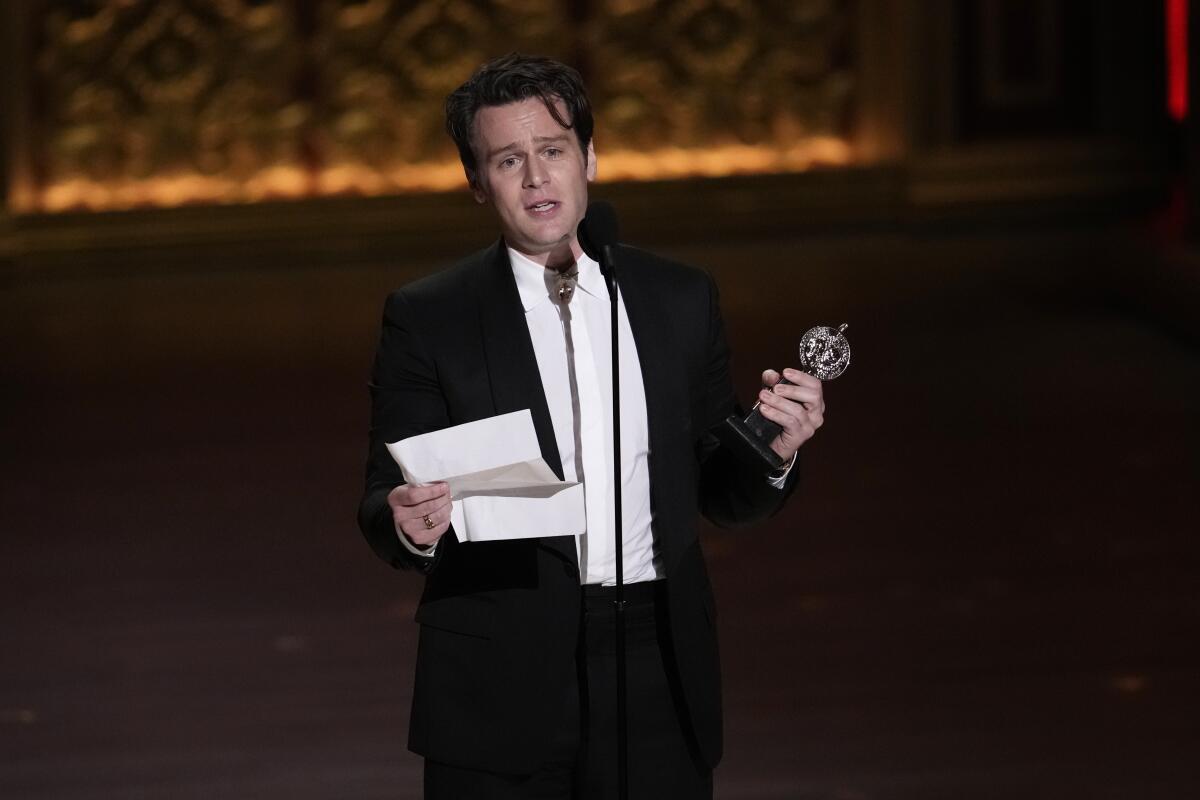
An emotional Jonathan Groff accepts the award for lead actor in a musical for “Merrily We Roll Along.”
(Charles Sykes / Invision / AP)
Lead actor in a musical
Brody Grant, “The Outsiders”
WINNER — Jonathan Groff, “Merrily We Roll Along”
Dorian Harewood, “The Notebook”
Brian D’Arcy James, “Days of Wine and Roses”
Eddie Redmayne, “Cabaret at the Kit Kat Club”
Lead actress in a play
Betsy Aidem, “Prayer for the French Republic”
Jessica Lange, “Mother Play”
Rachel McAdams, “Mary Jane”
WINNER — Sarah Paulson, “Appropriate”
Amy Ryan, “Doubt: A Parable”
Lead actor in a play
William Jackson Harper, “Uncle Vanya”
Leslie Odom Jr., “Purlie Victorious”
Liev Schreiber, “Doubt: A Parable”
WINNER — Jeremy Strong, “An Enemy of the People”
Michael Stuhlbarg, “Patriots”
Features actress in a play
Quincy Tyler Bernstine, “Doubt: A Parable”
Juliana Canfield, “Stereophonic”
Celia Keenan-Bolger, “Mother Play”
Sarah Pidgeon, “Stereophonic”
WINNER — Kara Young, “Purlie Victorious: A Non-Confederate Romp Through the Cotton Patch”
Featured actor in a play
WINNER — Will Brill, “Stereophonic”
Eli Gelb, “Stereophonic”
Jim Parsons, “Mother Play”
Tom Pecinka, “Stereophonic”
Corey Stoll, “Appropriate”
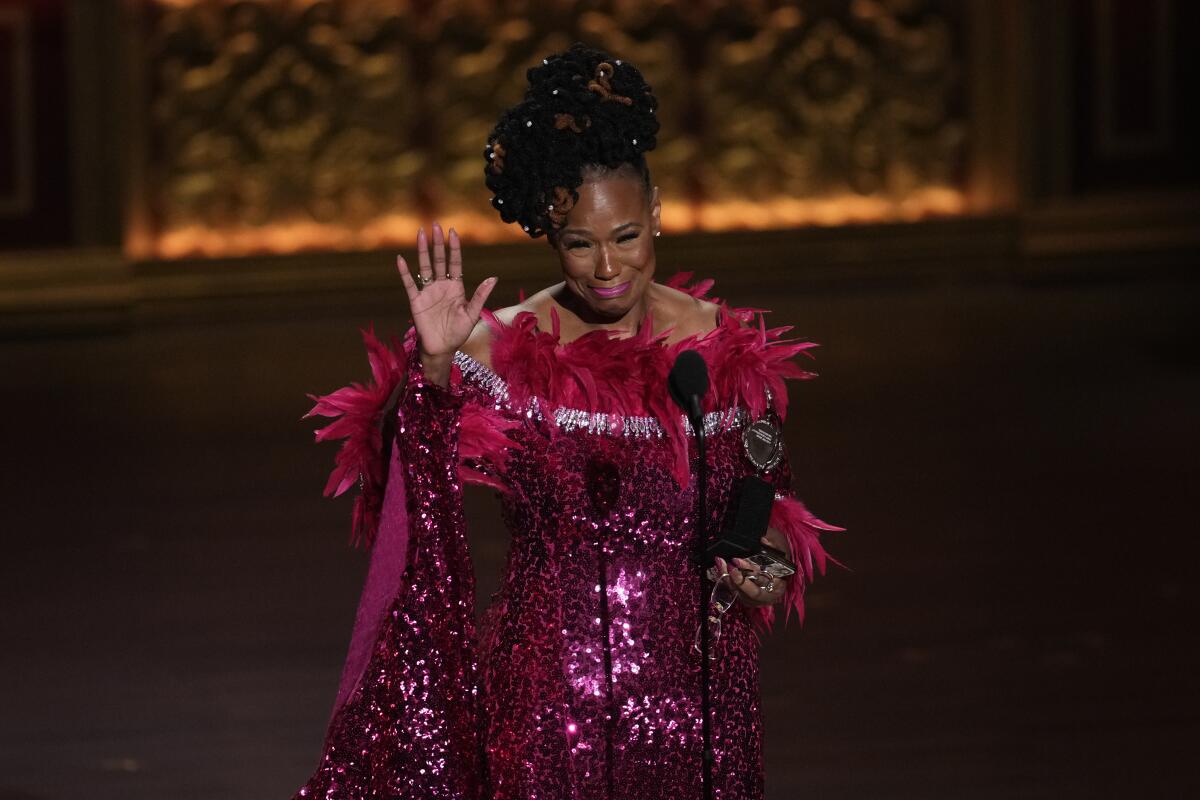
Theater veteran Kecia Lewis, winner for featured actress in a musical for “Hell’s Kitchen.”
(Charles Sykes / Invision / AP)
Featured actress in a musical
Shoshana Bean, “Hell’s Kitchen”
Amber Iman, “Lempicka”
Nikki M. James, “Suffs”
Leslie Rodriguez Kritzer, “Monty Python’s Spamalot”
WINNER — Kecia Lewis, “Hell’s Kitchen”
Lindsay Mendez, “Merrily We Roll Along”
Bebe Neuwirth, “Cabaret at the Kit Kat Club”
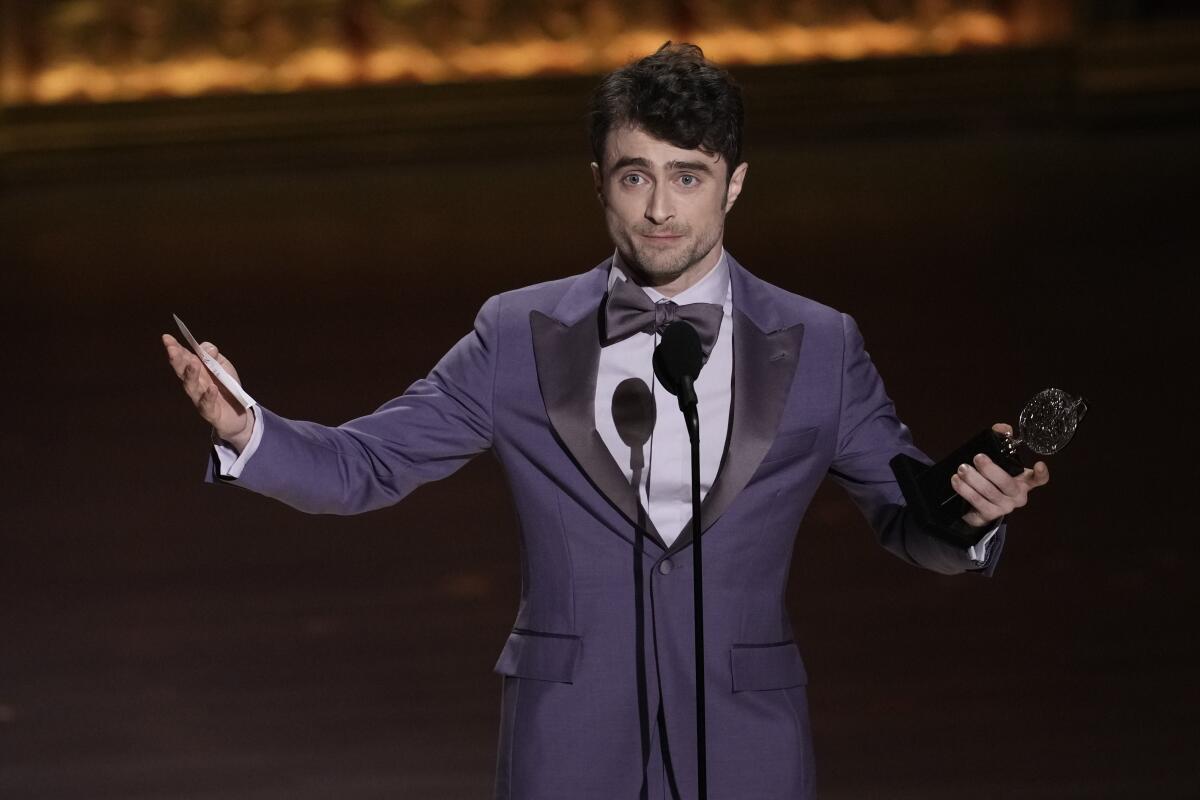
Daniel Radcliffe accepts the Tony Award for best actor in a featured role in a musical for “Merrily We Roll Along.”
(Charles Sykes / Invision / AP)
Featured actor in a musical
Roger Bart, “Back to the Future: The Musical”
Joshua Boone, “The Outsiders”
Brandon Victor Dixon, “Hell’s Kitchen”
Sky Lakota-Lynch, “The Outsiders”
WINNER — Daniel Radcliffe, “Merrily We Roll Along”
Steven Skybell, “Cabaret at the Kit Kat Club”
Direction of a play
WINNER — Daniel Aukin, “Stereophonic”
Anne Kauffman, “Mary Jane”
Kenny Leon, “Purlie Victorious: A Non-Confederate Romp Through the Cotton Patch”
Lila Neugebauer, “Appropriate”
Whitney White, “Jaja’s African Hair Braiding”
Direction of a musical
Maria Friedman, “Merrily We Roll Along”
Michael Greif, “Hell’s Kitchen”
Leigh Silverman, “Suffs”
Jessica Stone, “Water for Elephants”
WINNER — Danya Taymor, “The Outsiders”
Book of a musical
Kristoffer Diaz, “Hell’s Kitchen”
Bekah Brunstetter, “The Notebook”
Adam Rapp and Justin Levine, “The Outsiders”
WINNER — Shaina Taub, “Suffs”
Rick Elice, “Water for Elephants”
Orchestrations
Timo Andres, “Illinoise”
Will Butler and Justin Craig, “Stereophonic”
Justin Levine, Matt Hinkley and Jamestown Revival (Jonathan Clay and Zach Chance), “The Outsiders”
Tom Kitt and Adam Blackstone, “Hell’s Kitchen”
WINNER — Jonathan Tunick, “Merrily We Roll Along”
Choreography
Annie-B Parson, “Here Lies Love”
Camille A. Brown, “Hell’s Kitchen”
Rick Kuperman and Jeff Kuperman, “The Outsiders”
WINNER — Justin Peck, “Illinoise”
Jesse Robb and Shana Carroll, “Water for Elephants”
Scenic design of a play
dots, “Appropriate”
dots, “An Enemy of the People”
Derek McLane, “Purlie Victorious: A Non-Confederate Romp Through the Cotton Patch”
David Zinn, “Jaja’s African Hair Braiding”
WINNER — David Zinn, “Stereophonic”
Scenic design of a musical
AMP featuring Tatiana Kahvegian, “The Outsiders”
Robert Brill and Peter Nigrini, “Hell’s Kitchen”
Takeshi Kata, “Water for Elephants”
David Korins, “Here Lies Love”
Riccardo Hernández and Peter Nigrini, “Lempicka”
Tim Hatley and Finn Ross, “Back to the Future: The Musical”
WINNER — Tom Scutt, “Cabaret at the Kit Kat Club”
Costume design of a play
Dede Ayite, “Appropriate”
WINNER — Dede Ayite, “Jaja’s African Hair Braiding”
Enver Chakartash, “Stereophonic”
Emilio Sosa, “Purlie Victorious: A Non-Confederate Romp Through the Cotton Patch”
David Zinn, “An Enemy of the People”
Costume design of a musical
Dede Ayite, “Hell’s Kitchen”
WINNER — Linda Cho, “The Great Gatsby”
David Israel Reynoso, “Water for Elephants”
Tom Scutt, “Cabaret at the Kit Kat Club”
Paul Tazewell, “Suffs”
Lighting design of a play
Isabella Byrd, “An Enemy of the People”
Amith Chandrashaker, “Prayer for the French Republic”
Jiyoun Chang, “Stereophonic”
WINNER — Jane Cox, “Appropriate”
Natasha Katz, “Grey House”
Lighting design of a musical
Brandon Stirling Baker, “Illinoise”
Isabella Byrd, “Cabaret at the Kit Kat Club”
Natasha Katz, “Hell’s Kitchen”
Bradley King and David Bengali, “Water for Elephants”
WINNER — Brian MacDevitt and Hana S. Kim, “The Outsiders”
Sound design of a play
Justin Ellington and Stefania Bulbarella, “Jaja’s African Hair Braiding”
Leah Gelpe, “Mary Jane”
Tom Gibbons, “Grey House”
Bray Poor and Will Pickens, “Appropriate”
WINNER — Ryan Rumery, “Stereophonic”
Sound design of a musical
M.L. Dogg and Cody Spencer, “Here Lies Love”
Kai Harada, “Merrily We Roll Along”
Nick Lidster for Autograph, “Cabaret at the Kit Kat Club”
Gareth Owen, “Hell’s Kitchen”
WINNER — Cody Spencer, “The Outsiders”
Original score (music and/or lyrics) written for the theater
“Days of Wine and Roses”
Music & Lyrics: Adam Guettel
“Here Lies Love”
Music: David Byrne and Fatboy Slim
Lyrics: David Byrne
“The Outsiders”
Music & Lyrics: Jamestown Revival (Jonathan Clay and Zach Chance) and Justin Levine
“Stereophonic”
Music & Lyrics: Will Butler
WINNER
“Suffs”
Music & Lyrics: Shaina Taub
Movie Reviews
‘Hit Man’ Movie Review – Signals AZ

|
Text to speech audio articles made possible by the Quest Grant at Yavapai College. Tuition free industry recognized certificates for your career.
|
Hit Man is a fairly standard script. It doesn’t waste your time. It gets straight to the point. And it is a hell of a lot of fun.
Release Date: 05/24/2024Runtime: 115 minutesDirector: Richard LinklaterRotten Tomatoes: 97%iMBD: 7.1/10Where to Watch: Netflix |
  |
Mild-mannered professor of psychology and philosophy Gary Johnson (Glen Powell) lives at home with his plants, his birdfeeders, and his two cats Id and Ego
This sets up his character right away and tells the audience everything they need to know. He works part-time doing tech support for the local police, assisting on undercover ops to bust criminals trying to hire hitmen. But one day, the assigned agent is put on suspension at the last minute and Gary is chosen to take his place. Nervous, intellectual, science-obsessed Gary… their best option.
Whether he succeeds or fails will depend on if his anxiety gets the better of him. Walking into a diner to confront the criminal, everyone is on edge. But by the end, it’s clear that Gary is a natural.


The police department starts assigning him more jobs. As he gets into the act of convincing the targets that he is a lifelong criminal, he starts to take a liking to it—his psychology background and solo lifestyle affording him the flexibility to become anyone he needs to be to get them to let their guard down and make incriminating statements.
Then, one day, he meets a woman (Adria Arjona) attempting to escape from a dangerous husband
The lines between his real self and his undercover persona blur as he develops genuine feelings for her while also playing into her desires. This leads to a web of lies, confused identities, and criminal actions that stand apart from the usual tropes of the romantic comedy genre.
As expected, the truth does eventually come out, and in this one it does comes out in perhaps the most hilarious way possible. Discussing the specifics would spoil the story, but needless to say, the pressure builds over the course of the movie until an eventual release that circumvents the standards of the trope in a way that is absolutely delightful.
Despite its dark themes, this movie approaches its subject matter in a light-hearted way that will leave the most morally-upright audience member smiling by the end
Ultimately, it’s a story about identity, the flexible nature of reality, and who we are when personality can be constructed. “Seize the identity you want for yourself” is the quote the movie ends on, and it couldn’t have found a better, more absurd narrative to build that statement on.
About our Admit One Author


Isaac Frankel is a freelance writer and content creator specializing in reviews and analysis of cinema, interactive media, and mythological storytelling. He was raised in Prescott, AZ, wrote his first non-fiction book in 2013 after graduating from Tribeca Flashpoint College with a degree in Game & Interactive Media Design, and currently produces content for the YouTube channel: Off Screen.
More of his work and current projects can be found at www.isaacafrankel.com.
Read more stories from Dining, Entertainment, Recreation, & Travel on Signals A Z.com!
Subscribe and Be the First-2-Know!
-

 Politics1 week ago
Politics1 week agoNewson, Dem leaders try to negotiate Prop 47 reform off California ballots, as GOP wants to let voters decide
-

 News1 week ago
News1 week agoWould President Biden’s asylum restrictions work? It’s a short-term fix, analysts say
-

 World1 week ago
World1 week agoDozens killed near Sudan’s capital as UN warns of soaring displacement
-

 News1 week ago
News1 week agoRead Justice Clarence Thomas’s Financial Disclosures for 2023
-

 World1 week ago
World1 week ago‘Bloody policies’: Bodies of 11 refugees and migrants recovered off Libya
-

 Politics1 week ago
Politics1 week agoEmbattled Biden border order loaded with loopholes 'to drive a truck through': critics
-

 Politics1 week ago
Politics1 week agoGun group vows to 'defend' Trump's concealed carry license after conviction
-

 Politics1 week ago
Politics1 week agoShould Trump have confidence in his lawyers? Legal experts weigh in


















